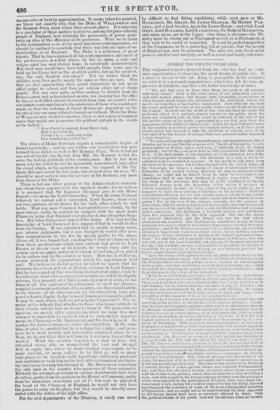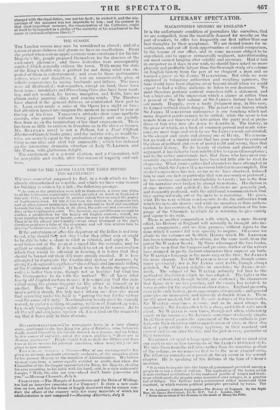GEORGE THE FOURTH VINDICATED.
THE subjoined remarks proceed from one who has had no com- mon opportunities of observing the great drama of public life. If a tinge of Ilivour to the late King is perceptible in the estimate, we refer it to a personal acquaintance, which has left its long im pression of kindness, together with better knowledge of facts.
" The evil that men do lives after them, the good is oft interred' with their hones.' Such is the observation of one intimately conver- sant with human nature ; but though little favourable, it yet allows of what decency might claim—the interment of the individual, before his merits are forgotten or his frailties announced. How different has been the course pursued by some of our public writers on the death of George the Fourth. Scarcely was the death of him who had been for weeks the professed object of a nation's prayers known• to the public, when the town was inundated with all that could be collected of the evil of his life and the errors of his youth, represented in a way that gave them the appearance of the habits of tnaturer age ; whilst his most brilliant career in the exercise of political power was scarcely noticed ; as if those great events which had secured to him the gratitude of nations, were to be lost sight of by the revival of charges that even personal malice appeared to have forgotten. " We acknowledge the right of animadversion, and we are too sensible of its value, not to respect the fair exercise of it. The life of Georgethe Fourth is now matter of history. and as such may, if faithfully given, he highly profitable ; but let the good be at least as fully recorded as the bad parts of it. If the dark shades of his character are to be presented, let not the more brilliant points be omitted. The character of a king is not to he collected from his conduct as a prince. In his youth lie may have been the slave of his passions ; but if when charged with the sacred duties of the Sovereign, we witness a display of energy of mind equal to all the difficulties of his exalted station, however we may he surprised at the change, we ought not to detract from its value by reference to cir- cumstances that at one time rendered it highly improbable. Shall the claim of the Sovereign who may be justly considered as having delivered Europe from the despotism under . which it groaned in 1810 be forgotten, because, in 170, when of the age of eighteen, be is supposed to have been wanting of kindness to his mistress ? Shall his unremitting attention for the last twenty years of his life to the pnblic interests be forgotten, because his earlier years had been wasted in dissi- pation ? We, in this view of the subject, concede, for the purpose of illustration, that his mistress had reason to complain ; and that dissipation was the course of his early life ; but it is only for illustration that we make such a concession. Mrs. Robinson, a beautiful actress, was not drawn from her conjugal duty by the I lcir Apparent. Site was the object of general adnuration, and the Prince was not the first whose admiration was requited. Her husband was considered as one of those husbands who regard chastity in a wife as by no means essential to conju- gal felicity ; and if the Prince ever possessed her affections, she certainly afterwards transferred them to a gallant officer, whose military renown she appears to have estimated as highly as the Prince's personal attrac- tions. We state this,. riot to prejudice the memory of that lady, who was not only one of the most beautiful, but also one of the most talented of her day ; but certainly was not so remarkable fur propriety of conduct as to exclude tile pessihility of her having, on any occasion, justified her lover's manifesting displeasure towards her. " As to the charge of dissipation in early life, there are few to whom the
o. from
same objection may nut apply. But who would think 011 I from Mr. Fox the tribute due to his public services, because he -was dissipated in his youth ; and what would have been thought of the man who, whilst the nation was deploring the recent loss of the patriot, should have called their attenticm to the errors of the individual.
" It has been said that the associates of George the Fourth, when Prince of Wales, were persons of a description that disgraced th:: Royal presence. There may have been persons received by him who had no pretension to such honour, but we believe that the instances, if any, are very fee; for though he was distinguished bY his urbanity and affability, no l'rince was ever more tenacious of his dignity, nor inure quick and happy in his perception of the character of those who approached " When he is charged with having Leen unsteady in his friendships and waverin:re' in his politics, we should du well to examine instances. Friend- ship is aterm too frequently applied to that which would scarcely amount to intimate acquaintance ; aud the interruption of intercourse may be referred to so many circumstances, even in common life, that we ought to be slow in deciding upon the sufficiency of the cause of it in the very highest sphere of society ; and much more slow in pronouncing it a vio- lation of friendship. With respect to wavering in politics or defection from party, it might perhaps have been more discreet if the I leir Apparent had never been a party man. Great allowance, however, is due to the Prince for becoming so. I le bad rights to assert which he could not singly have established. The Regency question, at an early period, involved him in a contest with Mr. l'itt, and the aid of Mr. Fox became indispensable. Thai Mr. FOx was mistaken in his view of the right, was not the fault of the Prince : the error in stating his Royal Highness's claim to fill the throne without the intervention of the Houses of Parliament—which always ap- peared to us to be a very extraordinary doctrine—originated, we believe, with Lord Loughborough. But, without entering into the merits of his claim, the assertion of it, in 1789, necessarily led to a party connexion, as it did also at a subsequent period. His claim to the arrears of the Duchy of Cornwall, though of a more private nature, also required Parliamentary aid ; and they who afforded it became, of course, more closely connected with the Prince than, perhaps, under other circumstances they would have been. And with respect to the Prince's having deviated from the principles which were regarded as the principles of his party, there were many cur - cumstances which, during the eventful reign of George the Third, alarmed and staggered the constancy of some of the most distinguished members of Opposition ; and we ought not to be surprised that the Heir Apparent to the throne should have been as seriously affected by them. That the political friends of his youth were not his advisers when he became
charged with the regal duties, was not his fault ; he wished it, and the mis- carriage of the measure was not imputable to him; and his consent to that most important measure, the emancipation of the Catholics, ought of itself to be regarded as a pledge of the sincerity of his attachment to the cause of civil and religious liberty."



























 Previous page
Previous page